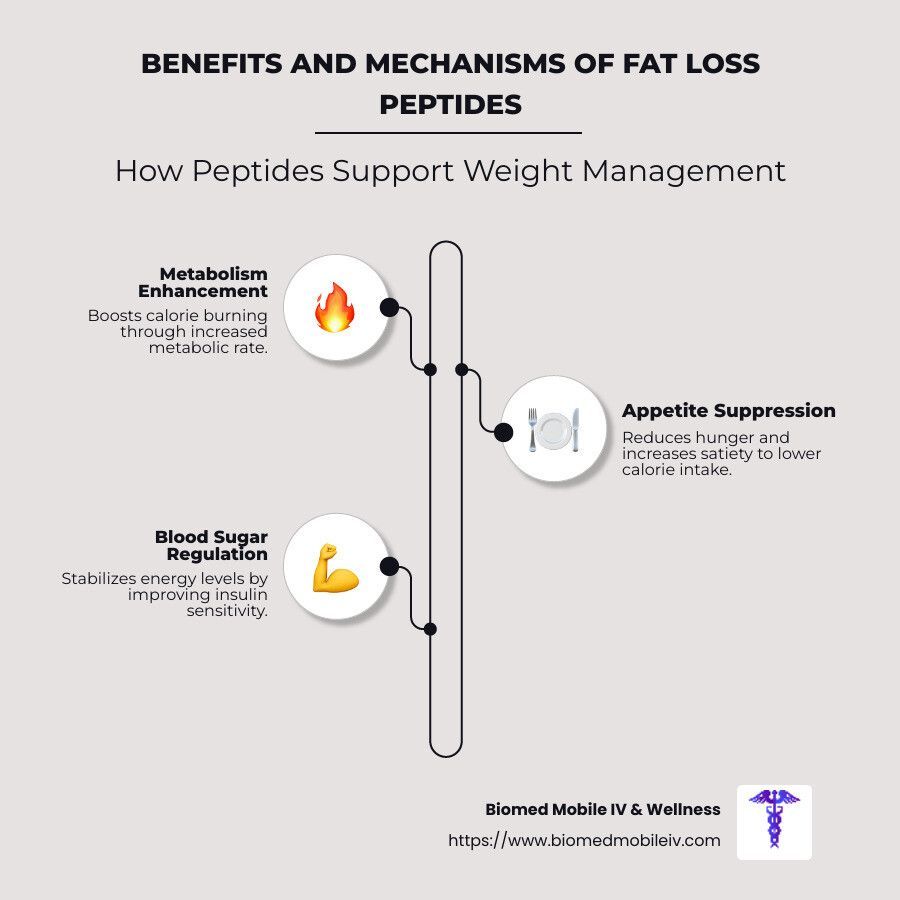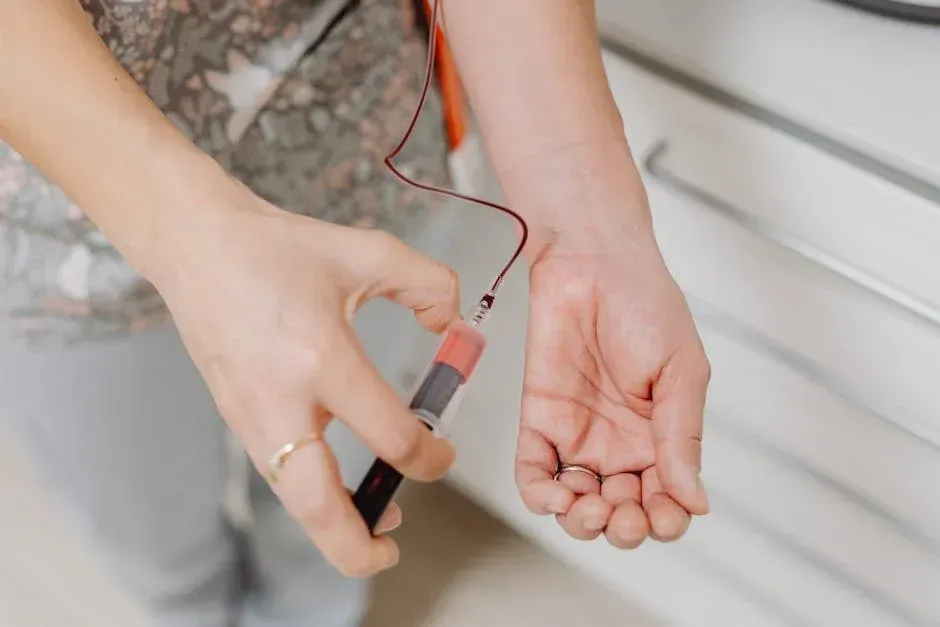Peptides Unpacked: Your Guide to Fat Loss and More
Fat loss peptides are gaining popularity as an innovative approach to weight management. These peptides can potentially help regulate metabolism, improve fat burning, and promote overall weight loss by:
- Increasing metabolism to burn more calories.
- Promoting lean muscle growth, which aids in fat loss.
- Suppressing appetite to reduce calorie intake.
- Regulating blood sugar levels for stable energy.
These peptides offer a promising adjunct to traditional weight management strategies, combining the benefits of diet and exercise with cutting-edge science. But how exactly do they function, and what role do they play in weight loss? Let's solve these questions to understand their full potential.
My name is Travis Sugg, founder of Biomed Mobile IV & Wellness. With a robust background in paramedicine and IV therapy, I've devoted years to exploring how fat loss peptides can complement traditional nutrition and fitness strategies. This article will guide you through the essentials, so whether you're dealing with fatigue or looking to shed some pounds, you'll be informed and ready for action.

Understanding Fat Loss Peptides
Fat loss peptides are a fascinating area of science that can help with weight management by targeting metabolism, appetite, and fat storage. Let's take a closer look at the main types of peptides used for fat loss.
GLP-1 Agonists
GLP-1 agonists are a class of peptides that primarily help with weight loss by reducing appetite and improving blood sugar control. These peptides mimic the action of the natural hormone GLP-1, which plays a role in regulating hunger and glucose levels.
- Semaglutide: Known by brand names like Wegovy and Ozempic, semaglutide is FDA-approved for weight loss and diabetes management. It works by decreasing hunger and stabilizing blood sugar levels.
- Liraglutide: Another GLP-1 agonist, liraglutide is also used to manage weight and type 2 diabetes, often under the brand name Saxenda.
- Tirzepatide: This peptide is unique because it targets both GLP-1 and GIP receptors, enhancing its effects on fat metabolism and insulin sensitivity. Though primarily approved for type 2 diabetes, it's used off-label for weight loss.
Growth Hormone Releasing Peptides (GHRPs)
Growth hormone releasing peptides stimulate the body's natural production of growth hormone, which can help with fat loss, muscle maintenance, and overall metabolic health.
- CJC-1295: This peptide promotes the prolonged release of growth hormone, aiding in fat loss and muscle gain. It's often used in combination with other peptides for improved results.
- Ipamorelin: Known for its selectivity, Ipamorelin increases growth hormone levels without significantly affecting other hormones, making it a popular choice for those looking to avoid increased hunger.
- Sermorelin: Often used to support growth hormone levels in aging adults, sermorelin can help maintain muscle mass while promoting fat loss.
Fat-Targeting Peptides
These peptides specifically focus on breaking down fat and improving metabolic health.
- AOD-9604: A fragment of human growth hormone, AOD-9604 is designed to burn fat without affecting blood sugar levels. Though not FDA-approved for weight loss, it's used off-label to target stubborn fat areas.
- Tesamorelin: Originally approved for reducing abdominal fat in HIV-associated lipodystrophy, tesamorelin is used off-label for general fat reduction and metabolic health improvement.
Fat loss peptides offer a promising new frontier in weight management, providing targeted approaches to tackle different aspects of metabolism and fat storage. Whether you're looking to suppress appetite, boost metabolism, or specifically target fat, these peptides can be a valuable part of your weight loss strategy.
In the next section, we'll explore how these peptides aid in weight loss through appetite suppression, blood sugar regulation, and muscle retention.
How Peptides Aid in Weight Loss
Peptides offer a unique approach to weight loss by addressing key areas like appetite suppression, blood sugar regulation, and muscle retention. Let's break down how these fat loss peptides work to help you shed those extra pounds.
Appetite Suppression
One of the most significant ways peptides help with weight loss is by suppressing appetite. GLP-1 agonists like semaglutide and liraglutide mimic the hormone GLP-1, which signals your brain that you’re full. This reduces hunger and helps you eat less without feeling deprived.
By enhancing feelings of satiety, these peptides make it easier to stick to a calorie-controlled diet, which is crucial for weight loss success.
Blood Sugar Regulation
Regulating blood sugar is another critical factor in managing weight. Peptides like tirzepatide not only suppress appetite but also improve insulin sensitivity. This means your body can manage glucose levels more effectively, preventing spikes that can lead to increased fat storage.
- Insulin Sensitivity: Improved insulin sensitivity helps your body use glucose more efficiently, reducing the risk of storing it as fat.
- Glucose Control: By stabilizing blood sugar levels, peptides help prevent cravings and energy crashes.
Muscle Retention
While losing fat, maintain muscle mass. Growth hormone releasing peptides like CJC-1295 and Ipamorelin stimulate the natural production of growth hormone, which is vital for muscle maintenance and fat metabolism.
- Muscle Mass: These peptides help preserve muscle during weight loss, ensuring that the weight you lose is primarily fat.
- Fat Metabolism: By boosting growth hormone levels, peptides improve your body's ability to break down and use stored fat for energy.
Using peptides in a weight loss plan can lead to a more balanced approach, addressing the challenges of appetite, blood sugar, and muscle retention. This makes them a valuable tool in achieving and maintaining your weight loss goals.
In the following section, we'll discuss the safety and potential side effects of using fat loss peptides.
Safety and Side Effects of Fat Loss Peptides
When it comes to using fat loss peptides, understanding their safety and potential side effects is crucial. While these peptides can offer significant benefits, they also come with some risks that users should be aware of.
Common Side Effects
Using peptides like Wegovy, Saxenda, and Zepbound can lead to several common side effects. These include:
- Nausea: A frequent side effect that many users experience, especially when starting treatment.
- Diarrhea: Some individuals may experience gastrointestinal discomfort, including diarrhea.
- Vomiting: This can occur as the body adjusts to the peptide therapy.
Other side effects might include headaches and dizziness. It's essential for users to monitor their symptoms and consult with a healthcare provider if they experience severe or persistent side effects.
FDA Approval and Safety
The FDA has approved certain peptides for weight loss, including Wegovy and Saxenda. These approvals are based on clinical trials that demonstrate their effectiveness and relative safety for weight management. However, not all peptides are FDA-approved for weight loss, so it's important to use only those that are verified for this purpose.
- Wegovy (semaglutide): Approved for chronic weight management in adults with obesity or overweight.
- Saxenda (liraglutide): Also approved for weight management, particularly in those with weight-related health conditions.
- Zepbound (tirzepatide): While primarily used for type 2 diabetes, it is gaining attention for its weight loss benefits.
The FDA cautions that these medications may not be suitable for everyone. For instance, Wegovy and Zepbound are not recommended during pregnancy due to potential harm to the fetus. It's also advised that individuals with a history of certain medical conditions, like medullary thyroid cancer, avoid these treatments.
In summary, while fat loss peptides can be effective tools for weight management, they are not without risks. It's imperative to consult with healthcare professionals to ensure that these treatments align with your health needs and conditions.
Next, we'll address some frequently asked questions about using peptides for fat loss.
Frequently Asked Questions about Fat Loss Peptides
What are the best peptides for fat loss?
When it comes to fat loss peptides, several options stand out due to their effectiveness and popularity.
- CJC-1295: Known for boosting growth hormone levels, CJC-1295 helps in promoting muscle growth and fat loss. By increasing insulin-like growth factor 1 (IGF-1), it aids in fat metabolism and muscle retention, making it a favorite among those looking to shed fat without losing muscle mass.
- Ipamorelin: Often used in combination with CJC-1295, Ipamorelin is a selective growth hormone secretagogue. It stimulates the release of growth hormone, enhancing fat loss and muscle growth. Its ability to target growth hormone specifically, without significantly affecting other hormones, makes it a popular choice for minimizing side effects.
- AOD-9604: This peptide is a fragment of the human growth hormone designed specifically to target fat loss. Although not FDA-approved for weight loss, it is used off-label for its fat-burning properties without affecting blood sugar levels.
Do peptides for weight loss really work?
Yes, peptides for weight loss can be effective. They work through various mechanisms:
- Appetite Regulation: Peptides like GLP-1 agonists (e.g., semaglutide) help reduce hunger and increase feelings of fullness. This appetite suppression can lead to reduced calorie intake and, consequently, weight loss.
- Fat Metabolism: Peptides such as CJC-1295 and AOD-9604 improve the body's ability to burn fat by stimulating growth hormone release or directly targeting fat cells.
However, the success of these peptides can vary based on individual factors like lifestyle, diet, and exercise habits. Combining peptide therapy with a healthy lifestyle can maximize results.
Are there any risks associated with peptide therapy?
While peptide therapy can be beneficial, it comes with potential risks and side effects:
- Common Side Effects: Users may experience nausea, headaches, or gastrointestinal issues, especially when starting treatment. These side effects often diminish as the body adjusts.
- Drug Interactions: Peptides can interact with other medications, potentially altering their effectiveness or increasing the risk of adverse effects. It's crucial to consult with a healthcare provider to discuss any current medications before starting peptide therapy.
- Safety Concerns: Not all peptides are FDA-approved for weight loss, and using unapproved peptides can carry unknown risks. Always ensure that the peptides you use are verified for safety and efficacy.
In conclusion, while fat loss peptides offer promising benefits, they should be used cautiously and under medical supervision. Always consult with a healthcare professional to tailor a treatment plan that aligns with your health goals and conditions.
Conclusion
At Biomed Mobile IV & Wellness, we pride ourselves on offering personalized wellness solutions that cater to the unique health needs of each client. Our approach to peptide therapy is no exception. By integrating cutting-edge science with individualized care, we provide our clients with tools to improve their health and well-being.
Peptide therapy benefits are vast, ranging from weight loss support to improved muscle retention and metabolic regulation. These therapies are not just about shedding pounds; they are about optimizing your body's natural processes to achieve a healthier you.
For example, peptides like CJC-1295 and Ipamorelin are designed to boost growth hormone levels, promoting both fat loss and muscle growth. Meanwhile, GLP-1 agonists such as semaglutide help regulate appetite and blood sugar, making them powerful allies in the fight against obesity.
Our mobile services bring these advanced therapies directly to your doorstep, whether you're in Denver, Boulder, or any other location in the Colorado Front Range. This convenience ensures that your wellness journey is as seamless and stress-free as possible. With our expert-led care, you can feel confident that you're receiving safe, professional, and empathetic treatment custom to your specific health goals.
Choosing Biomed Mobile IV & Wellness means choosing a comprehensive approach to wellness. We address a full spectrum of health needs, from hydration and immune support to peptide therapy and beyond. Our commitment to personalized wellness ensures that you receive the best possible care, helping you achieve your health goals effectively and sustainably.
Ready to explore the benefits of peptide therapy? Find more about our Weight Loss IV Therapy services and start your journey to a healthier you today.



